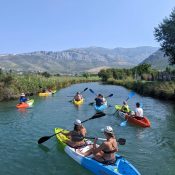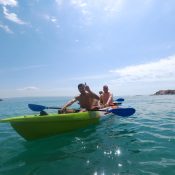
The Cold History of Kayaking: From Inuit to Today
The Cold History of Kayaking: From Inuit to Today
Who was the first kayak builder?
Let’s paddle through a time machine and get back to around 5000 years ago. Kayak was first built and called “qajaq” more known as “hunter’s boat”
But for who?
Greenlander, eskimo and inuit.
For them, the kayak’s true purpose was to be used for hunting and transportation. They would put the white cloth in front of their kayak and silently sneak up behind their prey ( in most cases seals ) and this would perfectly work because seals would get fooled by thinking it was just a drifting piece of ice.
Apart from the double paddle used to propel the kayak in the water, a harpoon and spear were also fastened to the kayak when hunting.
How long does it take them to build a waterproof kayak?
At first, it might seem like a lifetime.
Building kayaks and making them sustainable enough for hunting and transportation wasn’t an easy job, especially back then.
But how they did do it?
Well, that was truly magic and Eskimos were quite resourceful, give them a little and they will make a lot.
A piece of driftwood, whale, or seal bones and you got the frame.
From there you cut the wood with a saw and get a little “will” and turn it into a tool called a bow drill.
Now, you somehow need to bend the wood, because kayaks must have ribs and backbone. Ribs to be able to sit down and backbone to give a final strength to the kayak.
Unfortunately, the process of bending wasn’t magical at all. At least not like in the movie Matrix, where Neo saw a kid who bent the spoon just by watching it.
Instead of that, they would make a fire, boil seal oil in a pot and carefully pour the hot oil over the wood. The wood slowly becomes soft enough to bent and get into the wanted shape.
Later on, the Eskimos women would tan the seal hides and sew them together to make the waterproof skin of a kayak.
They would also grease the seams with seal blubber & fish oil to make sure they were watertight.
Do you know who got the strongest jawline bite in the world?
Eskimos women.
Yes, you’ve heard me well.
The sewing technique includes chewing the seal skin to make waterproof sewn seams.
It was tasteless, but damn hard work, and because of that the traditionally Eskimos women developed strong jaw muscles, to the point where the average jaw can exert pressure in the range of 200lbs, the record is a force of 975lbs, by an Inuk )
Today’s model agency should send their models to a little practice in Greenland.
Joke aside, let’s move on to the actual size of the kayaks.
Is that a family yacht or kayak?
If you are like me and never get a chance to see the actual size of the kayak built by Eskimos, then at first you might think it was anywhere between 12 – 20 feet.
If you are in 2023, then hell yeah, you are close.
But back then the size of the kayak would go up to 60 feet ( 18.3 meters )
I told you, it was a family yacht, let’s go on vacation baby.
Joke aside again, that kayak was called umiaqs, and I hope the next time you sat down in the kayak, you will be blessed by nature, especially after knowing a little bit of the history behind kayaking.
Let’s skyrocket from Inuit kayak to 2023
Fasten your seatbelt and let’s see what happened next.
How those kayaks turn into Olympic sport and recreational sport for thousands of people all around the world?
To explain that part of the kayak history, allow me to get back to the mid-1800’s, when residents of Europe embraced the kayak design. Instead of using the vessels for hunting, they went ahead and created a sport called kayaking.
The kayak was first introduced as an Olympic sport in the 1936 Summer Olympics, held in Berlin, Germany. The event was dominated by Germany, with 11 out of the 12 medals going to German athletes. The sport was then dropped from the Olympic program after the 1948 Summer Olympics, but was re-introduced in the 1972 Summer Olympics, held in Munich, Germany. The sport has been held in every Summer Olympics since then.
From there, kayaking is no longer just a fringe sport, it became mainstream and USA manufacturers recognize the opportunity to capitalize on it.
The mass production of poly boats gave a rise to a new kayak called the recreational kayak. It is a type of kayak used today for recreational purposes.
Now, we are close to the end and I was a little bit concerned about how to end up this blog post.
And you know what?
I decided to go with a fun punchline related to whitewater kayaking – for those who don’t know what is it, feel free to click here to find out.
Now, as I promised, let’s finished with the fun punchline:
A newbie paddler asked his instructor if it was difficult to learn how to whitewater kayak.
The kayak instructor replied:
“No, it’s really easy to learn whitewater kayaking, you just go with the flow.”
By the way, if you ever find yourself in the middle of the town Split, then I am sure you might want to join us in a kayak adventure, so feel free to reach out to us and ask any question that bothers your mind.
until that, all love from Adriatic-Kayak
All Categories
Recent Posts
The Cold History of Kayaking: From Inuit to Today
7-Type of Flatwater Kayaks
How to use iSup








